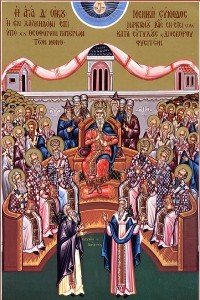In His Sermon on the Mount (Mat 5:1-7:29), Our Lord God and Savior Jesus Christ gives us a vivid description of the divine way of life, that is to say, He teaches us how to live as He does. This is especially evident when we bring to mind such verses as:
You have heard the commandment, ‘You shall love your countryman but hate your enemy.’ My command to you is: love your enemies, pray for your persecutors. This will prove that you are sons of your heavenly Father, for his sun rises on the bad and the good, he rains on the just and the unjust. If you love those who love you, what merit it there in that? Do not tax collectors do as much? And if you greet your brothers only, what is so praiseworthy about that? Do not pagans do as much? In a word, you must be made perfect as your heavenly Father is perfect. (Mat 5:43-48)
If we look closely at these and other such pronouncements, what we shall find is nothing less than Christ’s self-revelation. In other words, Christ is telling us how He lives, and how, therefore, we too should strive to live, if we would be perfect; if, that is, we would be as He is.
The beloved disciple John makes this clear when he says,
We know that, when he shall appear, we shall be like him; for we shall see him as he is. And every man that has this hope in him purifies himself, even as he is pure (1 Jn 3:2-3)
Thus, if we wish to be eternally with Christ, we must become like Him; and this process of becoming Christlike, this purification, invariably involves change, metanoia – a fundamental change in our whole way of life, in our mode of being.
What constitutes our mode of being? All of our attitudes of mind and behaviors. How we think about God, ourselves and others and the world constitutes our mode of being. People tend to act in accord with the way that they think. If we are bigoted and prejudiced, it comes out in our behavior.
Our reactions, then, in any and every situation and circumstance should be Christlike. Each time we find ourselves in difficult situations; each time that we are tempted to think or act according to the way of the world, and every time that we resist this impulse for the love of Christ, and ask for His help and mercy, we are indeed taking up our cross, we are indeed striving to change our way of life in accordance with Christ’s way of living, commandments and example, we are indeed beginning to repent. This is the process of Theosis. Personal spiritual growth and transformation is found in this process.
So salvation is much more than just believing. It also involves voluntary personal transformation.

